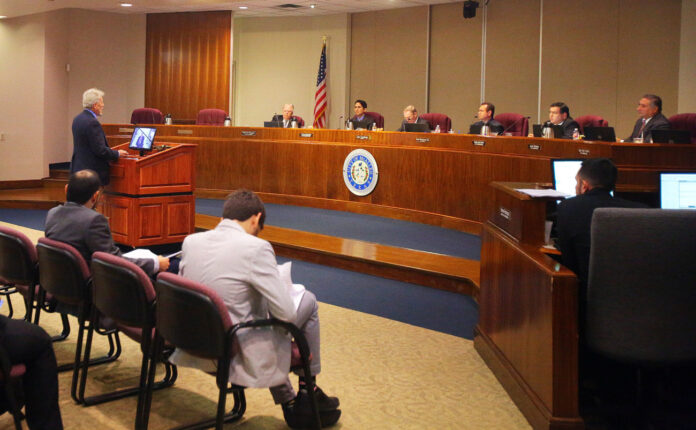McALLEN — City commissioners and public utility board members in McAllen on Monday unanimously passed a $422 million budget that will slightly increase property taxes, add more than two dozen city employees, including firefighters and police officers, and will dedicate millions of additional dollars to paving, walking and cycling trails and traffic and drainage improvements.
“There’s a lot for you to brag about,” City Manager Roel “Roy” Rodriguez told the elected officials of the budget, which he has called the most important document in the city.
Perhaps most notably, sales tax revenues over the last year were record breaking for the city, Rodriguez said, exceeding $63 million. That increase, and Rodriguez’s projected 2.5% sales tax increase for the next fiscal year, which begins Oct. 1, will allow for nearly $4 million of sales tax revenues that will be transferred to street and infrastructure improvements — there is more than $100 million dollars budgeted for these capital improvements, Rodriguez said.
“I don’t know that we’ve had a number that big in a while,” the city manager said.
The budget mostly aligns with what Rodriguez outlined to city commissioners at the start of four consecutive weeks of budget workshops in August: prioritize public safety. Sales tax revenue increases have allowed for some flexibility and city employees have been leaving at an alarming rate, something city commissioners were concerned about, which even warranted a detailed powerpoint presentation from one of Rodriguez’s deputies.
“We’re very proud of the workforce we have here in McAllen,” Assistant City Manager Jeffrey Johnston said at the Aug. 20 budget workshop.
Yet McAllen employees had only received nine paid holidays off — the lowest in the Valley alongside Harlingen, Johnston said — up until city commissioners during this budget process approved granting them three additional holidays, now tied with the Valley average.
“One of the things that’s important to them is what’s known as work-life balance,” Johnston said of “the millennial generation,” the 23 to 38-year-old demographic that Johnston said amounts to 45% of McAllen’s 1,900-full-time employee workforce.
In 2018, more than 15% of city employees turned over, “which is not what we’re looking for,” Johnston said. But 50% of the employees who left departed for a “better opportunity,” he added. That attrition number also doesn’t always tell the full story —some McAllen police officers, for example, have over the years left for better paying federal law enforcement jobs that the city would be hard pressed to compete with.
Leadership at city hall has also remained intact for several years, which has afforded city employees little opportunities to advance to the upper tiers of the organization — multiple department directors in recent years have left for similar or more senior jobs in other South Texas cities.
However, pay remains an issue.
“Now, when you look at other cities around the Valley, we’re almost smack dab in the middle in terms of what we pay,” Johnston said.
But the city has gone 12 years without conducting a salary study comparing McAllen employees to other city employees in South Texas and across the state, a process Johnston said the city had done periodically to ensure it remains competitive in the region. As part of the 2019-2020 Fiscal Year budget, commissioners approved funding for the employee pay study.
“I think we addressed some of it,” Darling said of the employee issues.
For now, the budget is balanced and city officials said they’re excited about the projects to come over the next year. And safety valves are in place if projections are off, Rodriguez said.
“Even if we’re flat next year,” he said of sales tax revenues, “we should be OK.”





